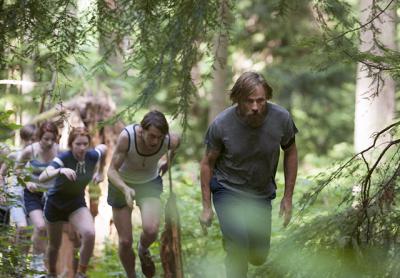'Captain Fantastic' And How You Raise Your Kids

Jamie Patricof was disappointed he could not be in East Hampton for the opening of the film “Captain Fantastic” last Friday. Not because he hadn’t seen it; with Lynette Howell Taylor, he co-produced the film and had in fact seen it countless times. However, having spent summers and weekends here for much of his life, he fondly remembers the theater before it was a multiplex.
“It was where I had my most memorable experiences of going to the movies,” he said during a recent telephone call from Los Angeles. “I saw ‘Star Wars’ there. We’d sometimes sneak in through the back door, but that’s another story.”
Since its release on July 8, “Captain Fantastic” has received almost unanimously favorable reviews. Joe Morgenstern, The Wall Street Journal’s film critic, called it “a tremendously accomplished and enjoyable film about a singular household.”
The New York Times critic Manohla Dargis said of the film’s director, Matt Ross, his “insistence on taking your intelligence for granted is itself a great turn-on. His characters don’t need smartphones to do their thinking for them; he assumes the same holds true of his audience.”
When the film opens, Ben Cash and his six children are living in a large tepee-like structure deep in the woods of the Pacific Northwest, where he runs what seems at first a survivalist boot camp. When Ben learns his wife has committed suicide after several months of institutionalization for bipolar disorder, he loads the children into an old bus-cum-R.V. for a trip to New Mexico for the funeral, despite his father-in-law’s warning that he will be arrested if he tries to attend.
What follows is a suspenseful battle between Ben’s commitment to raising his children according to his values — home schooling, survivalist training, living off the land, and radical political ideas — and his wealthy father-in-law’s (Frank Langella) conviction that the family’s lifestyle is responsible for his daughter’s death. Lest that conflict sound schematic, however, the characters are so fully realized on the page and represented with such nuance by the actors that the audience’s sympathies are constantly shifting between them before ultimately settling on their fundamental, if flawed, humanity.
“Captain Fantastic” is the second film written and directed by Mr. Ross, who is also an accomplished actor, perhaps most familiar as Gavin Belson from the HBO series “Silicon Valley.” He won the best director award at this year’s Cannes Film Festival in the Un Certain Regard category for “Captain Fantastic.”
During a recent conversation with Mr. Ross, the director ex plained that the primary impulse behind the writing of the film was parenthood. “It’s very much for me about being a father. My daughter is 13, my son is 9, and I was writing it a couple of years ago at a point in my life when I realized how quickly it was going.”
“When you’re a parent, you think a great deal about what you’re passing on to your kids, and I was really becoming kind of obsessed with what it was my wife and I were teaching them. In a way, the film presents an extreme choice of conscious parenting by positing a father who decides to devote his every waking moment to raising his children.”
When Ms. Taylor first read the script, she knew it was exceptional. “You read so many screenplays, and it’s rare to find one so unusual, needing so little development. Jamie and I both knew immediately it was a project we wanted to be involved with.”
Mr. Patricof added that for him, as a father of two, “it brought up all those issues of how you raise your kids.” He recalled that as a child he loved outdoor activities, one of his favorites being camping with his father in Cedar Point Park. “I sort of got away from that, but now I’m more interested in getting back outdoors, and I think it has something to do with the film.”
Mr. Ross said he didn’t have a specific actor in mind for the role of Ben, because “you don’t know who you’re going to have access to and who’s going to be available even if you do have access to them. But when it came time to cast, Viggo was my first choice, and we were very fortunate that he wanted to do the movie.”
“When Frank Langella agreed to do the role, he spoke a great deal about how it was important to him not to be a one-dimensional villain. I said to him, ‘Your character is antagonistic toward Viggo’s character, but you are not the antagonist.’ I think if you have a protagonist who behaves like an antagonist and an antagonist who behaves like a protagonist, that’s much more like real life. Not only is it more real, it’s better storytelling.”
Mr. Patricof’s parents have long had a house on Huntting Lane in East Hampton Village. His brother, Jonathan, is a trustee of Guild Hall, and Jamie Patricof is on the board of the Kendall Madison Foundation. “I spent so much time there growing up, and I still have close friends there,” he said. “It will always be a special place for me.”
